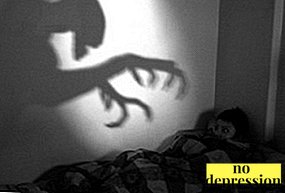Every person sometimes has to wake up in a sweat after terrible dreams. Nightmares are a cause of sleep disturbances, affect the state of health during the day due to night sleep loss, and can also trigger anxiety and irritability.
What are the causes of nightmares, how can you get rid of them? You will learn the answers to these questions by reading this article.
The content of the article:
Risk group, causes of nightmares
Ways to fight
Psychologist's comment
Risk group
Most often, terrible dreams come to children. This phenomenon in childhood is not a violation: in this way, the children's psyche fights fears, learns to accept and experience them. The most prone to nightmares are children from 4 to 8 years. 
Also, nightmares often dream of people with rich imagination: artists, journalists, musicians, writers and other representatives of creative professions.
Nightmare dreams can also be a side effect of professions involving risk or the need to see violent scenes or death. This subgroup includes firefighters, police, doctors, rescuers, military.
Causes of Nightmares
The most common cause of nightmares is eating at bedtime. Overloaded evening snack stomach works in full force and does not allow the body to relax. The feeling of heaviness and uncomfortable condition associated with overeating, also do not contribute to good sleep.
The second popular explanation why nightmares are dreaming is drunkenness or hangover. Brute force has a negative effect on the entire body as a whole, and problems with sleep are its usual consequences.
One of the causes of nightmares can be a serious event or an experience that happened the day before: parting with a loved one, terrible news or violence. Extreme life situations provoke strong inner experiences, which are reflected in dreadful dreams.
 Severe illness with fever may also cause nightmares.
Severe illness with fever may also cause nightmares.
Starting to use or stopping the use of certain medications that affect the human nervous system may result in impaired restful sleep. If you have previously used sedatives or anti-depressants and abruptly stopped the course, nightmares can be a consequence of this act.
How to deal with nightmares?
Before you do something, try to figure out why nightmares are in your case.
If this is a one-time situation following excessive drinking or heavy food, try not to repeat this again. Eat at least 3 hours before bedtime, and try not to eat heavy foods at night: meat, nuts, legumes.
 Develop a bedtime ritual. Take a warm bath with aromatic soothing oils, put on clean pajamas, drink a cup of fragrant chamomile tea. Go to bed at the appointed time, do not stay up late.
Develop a bedtime ritual. Take a warm bath with aromatic soothing oils, put on clean pajamas, drink a cup of fragrant chamomile tea. Go to bed at the appointed time, do not stay up late.
Spend more time in the fresh air. Work in conditions of a closed room and radiation of household and office electronics provokes oxygen starvation, which is a frequent cause of nightmares. Try to return home on foot or walk at least a couple of stops to the house. On weekends, make forays into nature, and do not stay at home.
If you have had the same terrible dream several times, try to write it down in the smallest detail. Think about what each phenomenon can mean, discuss a dream with a loved one. Speaking the problem is part of psychological therapy, and in the case of nightmares it can significantly improve the situation.
If you often wake up in a nightmare process, try to present them with a positive ending. Reprogram your mind so that next time it can give a positive attitude.
For creative people, drawing is a great way to get rid of the nightmares that haunt them. Try to portray your dream on paper, using the materials you liked: paints, colored pencils, felt-tip pens. Art therapy is not in vain actively used by psychologists, as it has a useful sedative effect. 
Start playing sports. Studies show that people who do physical work every day do not suffer from nightmares. If physical work for you is associated only with cleaning the house or traveling to the country in the summer, sign up at the nearest fitness center and attend workouts a couple of times a week. Feasible physical exertion will be an excellent deliverer from terrible dreams.
If nightmares haunt you for a long time and the methods described do not help get rid of them, you should contact a psychotherapist. Perhaps the cause of terrible dreams are deep psychological trauma or nerve disease. A specialist will help you to correctly determine the cause of nightmares and prescribe the necessary treatment.
Oksana, Severodvinsk



